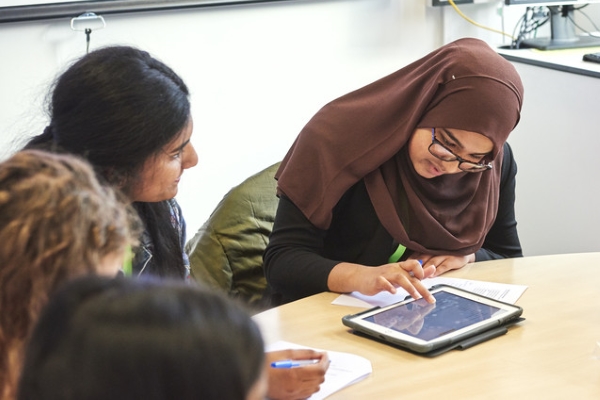Creativity entails exploration and movement into unknown and unmapped territories.
Exploring the visual arts - Creative Collections
Open to all, our campus hosts wonderful art collections at the Sainsbury Centre, an inspiring space for exploring cultures and creativity. Creative scholarship engages with the community, as it explores new routes to knowledge, engaging with diverse audiences in ways that are mutually enriching.
Dr Kate Dunton, Head of Learning at the Sainsbury Centre, uses the Centre’s exhibitions, collections, building and Sculpture Park to develop a range of co-creative projects with schools, third-sector partners, community groups, artists, writers, students and researchers.
Her current focus is on the role of galleries in developing emancipatory pedagogies and co-developing capabilities with a range of community partners. Seeking to democratise creative spaces during the pandemic, Dr Dunton has created a range of new gallery resources with partners including SEND schools, care homes, homeless and mental health charities, foodbanks, community centres, and academic colleagues at UEA.
Exploring being human in the 21st century
Our creative research addresses humanity, and the many different contexts in which lives are lived, across and between disciplines.
As UEA’s inaugural International Chair of Creative Writing, Tsitsi Dangarembga champions creative voices expressing experiences across the world, complementing her directorship of the Institute of Creative Arts for Progress in Africa. The position, created through philanthropy, will be offered to four more prominent writers over the next five years from Asia, Australasia, the Americas and the Middle East, each with a year-long remit to find, nurture and promote new voices from that region.
Other projects, such as Professor Tessa McWatt’s CityLife: Stories Against Loneliness, pairs writers with elders from marginalised and socio-economically underprivileged groups to produce literary non-fiction about life in London. Professor Jean McNeil’s new work, Day for Night, commemorates Walter Benjamin’s contribution to writing on art, literature and politics in an era when issues of statelessness, exile and migration have acquired a renewed charge.
)
The future of heritage
How do research and emerging technologies help us to understand the past? UEA is working with colleagues across the digital and cultural sectors, including the Norfolk Museums Service, to shift expectations of what museums can be.
Digital creatives and skilled museum professionals are finding new ways to celebrate and present museum collections, enhancing the valuable experiences of visiting a historic building or encountering a work of art for the first time.
UEA partners with the Norfolk Museums Service for their most ambitious project to date: ‘Norwich Castle: Gateway to Medieval England’. Supported by the National Lottery Heritage Fund, this £13.5m project will restore Norwich Castle’s Keep to its 12th century splendour as a Norman Royal Palace. It will also establish a new British Museum Partnership Gallery of the Medieval Period, and create a permanent presence for the British Museum in the East of England. A stunning viewing platform on the roof of the Norman Keep will give panoramic views of Norwich, linking past, present and future.
Exploring educational futures
UEA continues to be at the forefront of future-thinking in Education. From Lawrence Stenhouse’s pioneering research on interdisciplinary curriculum design for schools in the 1970s, to our current influence on global literacy and change through the UNESCO Chair Programme.
Researchers at our School of Education and Lifelong Learning collaborate with regional, national and international partners - as well as with colleagues across UEA - to imagine and help realise more equitable educational futures. We address questions about the role of social media and digital technology in learning, as well as join cultural and heritage sector organisations including the BBC and the East Anglian Film Archive in arts-based projects for school students in the region.
Alert to global student activism and young people calling for new education priorities around climate change, decolonising the curricula and changing economic circumstances, we also ask - ‘what can learning be?’ How can we fully realise human potential through different conceptions of schooling, higher education and learning through a lifetime?


:focus(2214x959:2215x960))